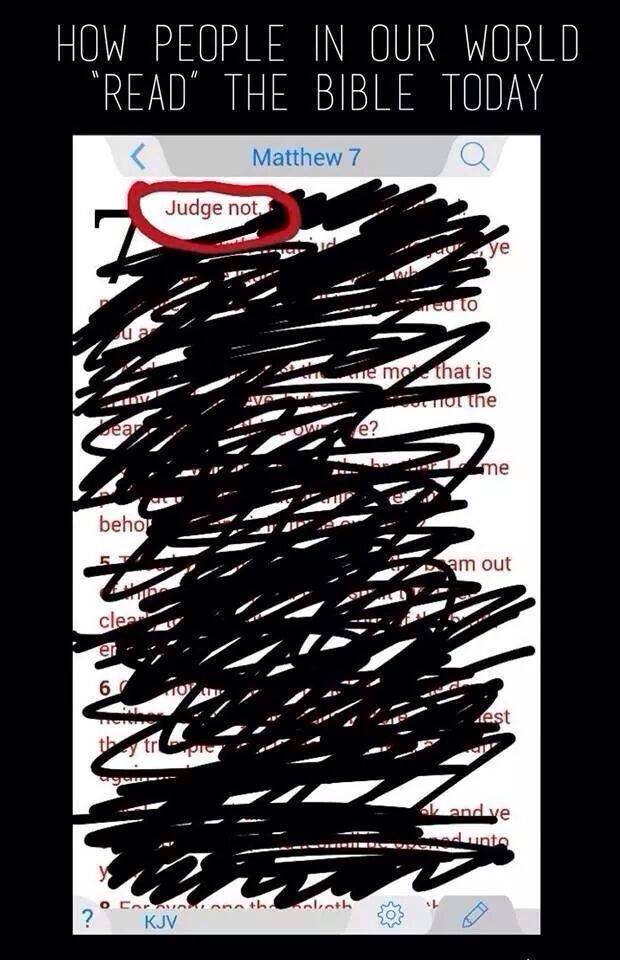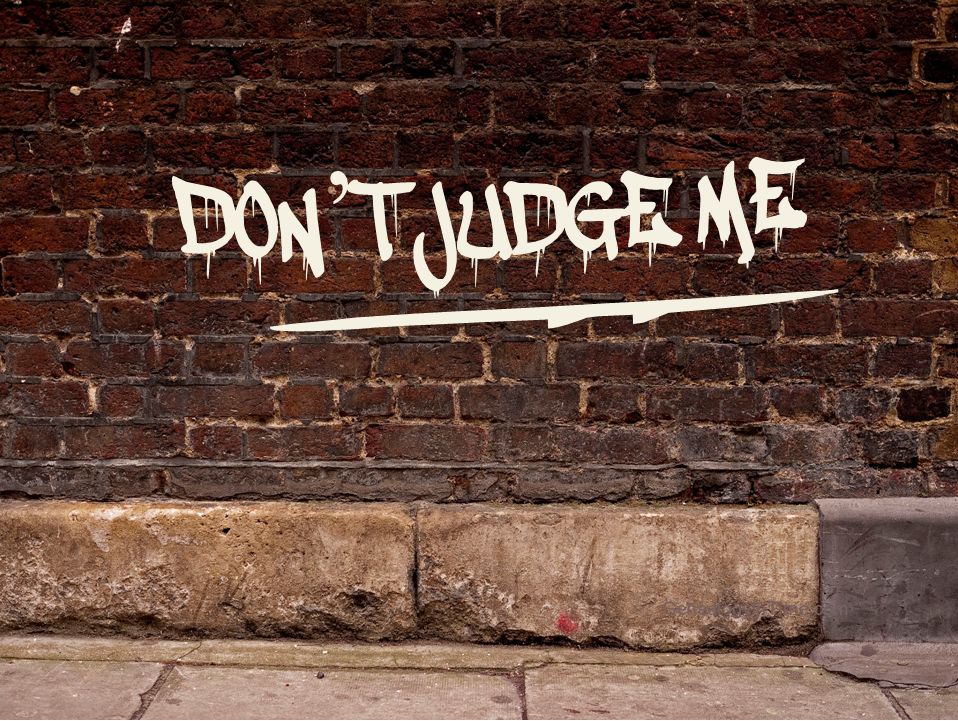Today we’re going to evaluate another meme that I have seen often on social media. Let’s look at it, then discuss what its creator was trying to say, then evaluate it to see what kind of message it portrays. Here it is:

Here’s the idea. This is how people read the Bible today: they take a couple words out of a passage, in this case, “judge not,” and focus on those while ignoring the rest of the passage.
But does this really happen?
Let’s think about this for a minute. Have you ever heard anyone say, “Don’t judge me!” or something like that? Usually that happens when someone is doing something that is wrong, and they don’t want to be told it is wrong. So, they reach into their bag of superficial theology, fish around for two random words that came out of Jesus’ mouth, throw them at you, then stare at you with that grin that says, “Ha! Jesus said not to judge me, so stop it!”
The real issue at play here is that the number one rule of hermeneutics is broken: context. Never just pull out a couple words and throw them around to manipulate someone to do what you want. All that accomplishes is that it reveals to the world that you have no idea what the Bible actually says because you are too lazy to study it—or in this case, to even read it.
To get the whole picture of what Jesus said, we have to read what He said.
Judge not, that you be not judged. For with what judgment you judge, you will be judged; and with the measure you use, it will be measured back to you. And why do you look at the speck in your brother’s eye, but do not consider the plank in your own eye? Or how can you say to your brother, ‘Let me remove the speck from your eye’; and look, a plank is in your own eye? Hypocrite! First remove the plank from your own eye, and then you will see clearly to remove the speck from your brother’s eye. (Matthew 7:1-5)
Before we look further into what Jesus actually said, we need to see what “judge” means. It simply means to make a decision about something that may result in condemning or punishing a behavior.
When Jesus said, “Judge not,” He immediately gave the reason why: “that you be not judged.” In other words, if you want to venture into the world of judging, be careful, because it’s going to come back on you. Don’t be so quick to pick the speck out of your brother’s eye while you have a plank in your own.
By the way, isn’t it interesting that Jesus said, “Judge not,” and then goes on to tell us how to judge? If you’re going to judge, first make sure you’re not guilty, then you can see clearly to help someone else.
When people say, “Don’t judge me!” they generally mean this: “Don’t tell me that I’m sinning!” Yet the Bible repeatedly tells us that we should be confronting people about their sin—as long as we do it with the right spirit and we ourselves are innocent of the same thing.
For example, Paul gave this instruction to the Galatians:
Brethren, if a man is overtaken in any trespass, you who are spiritual restore such a one in a spirit of gentleness, considering yourself lest you also be tempted. (Galatians 6:1)
So, if you see someone in sin, you’re supposed to do what—ignore them and let them be punished, then sit and laugh at them? No—you’re supposed to come alongside them, point out their sin, and get them on the path to restoration.
And guess what—that’s judging!
We all judge others every day. When you got mad at that guy for cutting you off in traffic, you were judging him. When you marched in a protest, you were judging those you were protesting against, and if you refused to march in a protest, you were judging those who were protesting. When you grounded your daughter for sneaking out after curfew, you were judging her.
So stop judging, and let everyone do what they want—after all, that’s what Jesus said! Not only is that an insane proposition, it’s thoroughly unbiblical.
If Jesus meant that we are never to notice anyone’s sin and point it out, then we don’t need laws, courts, police, or even parents. Every time we notice wrong behavior we are judging. Not only is that healthy, but it is necessary for any organization to continue—whether that organization is a family, a business, or a nation.
Jesus was teaching that if we are going to be pointing out the sins of others, we need to make sure we are innocent, because we will be held to our own standard.
So, back to the meme. The creator of this meme understood that focusing on two words and leaving out the rest will lead us to the wrong interpretation, and therefore a disastrous application. So, how do I judge this meme?
I think it’s great because it exposes a common problem: taking the Bible out of context. Never, ever take a few words in isolation out of the Bible, because if you do, you’re really going to mess up your life. Read the Bible, study it, and think about what it actually says. And while you’re at it, always think beyond the meme.



Everything you think Jesus said about it, though, is irrelevant because the scripture is out of context. The actual meaning of the text when interpereted by other scripture is this:
“If you judge another, your judgement is invalid, but you will not be judged. But if you aren’t saved, you will yet be judged, even if you never judge another.
“For it is not the measure of your judgement against others with which you would be judged, but against the infinite holiness of God that is measured against all those who are not born again, which will be held against you in judgement, because He is holy and cannot look upon sin.
“If you are saved, I will hide the log in your eye from the gaze of my Father, while the mote in your brother’s eye will have him expelled from the sanctuary and into the outer darkness, where there will be weeping and gnashing of teeth, and their worm will not die, and the fire will never be quenched. But you who are saved, will be spared fas vessels of mercy.
“In your depraved state, you can do nothing to remove the log from your own eye, no matter how obvious it is, because there is nothing good in you. I will remove the log from your eye in the last day.
“But woe to he who is not of the elect, for the Helper could not be bothered to remove a mote from the eye of him, your unsaved brother. As it is written, “I will have mercy on whom I will have mercy.” Even he who has a mote in his eye too small to be seen, the Father, whose eyes behold and judge the stains on the face of the sun, sees all of them the same, and will ensure that you pay to the uttermost for your sin.
“Therefore judge freely, but know it is in vain, becsuse my father shall find fault with anyone he hardens.”